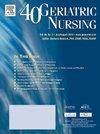Implementation of intervention programs specifically tailored for patients with cognitive impairment as comorbidity in early rehabilitation during acute hospitalization: An umbrella and scoping review
IF 2.5
3区 医学
Q3 GERIATRICS & GERONTOLOGY
引用次数: 0
Abstract
Introduction
Cognitive impairment (CI) is common among older hospitalized patients, posing risks for adverse events. However, the extent to which early rehabilitation interventions address CI needs is unclear. This umbrella and scoping review evaluates CI consideration in such interventions during acute hospitalization.
Material and Methods
Systematic reviews on early rehabilitation interventions for older patients were screened. Inclusion criteria encompassed CI mention in titles/objectives, patient assessment/description, inclusion of CI patients, (sub-) analyses by cognitive status, and tailored interventions.
Results
Of 199 studies, only 3% addressed CI in titles/objectives, 68% assessed cognitive status, and 42% lacked CI patient information. Only 4% targeted CI patients, 55% included mixed populations. In 12% of studies, CI patient results were reported, 8% adjusted analyses for CI. Only 5% tailored interventions for CI.
Discussion
Despite high prevalence, CI patients are largely overlooked in early rehabilitation. Future studies should consider CI in assessment, description, analysis, and intervention design.
针对急性住院期间早期康复中认知障碍合并症患者量身定制的干预方案的实施:概述和范围回顾
认知障碍(CI)在老年住院患者中很常见,带来不良事件的风险。然而,早期康复干预在多大程度上满足CI需求尚不清楚。本综述评估了急性住院期间此类干预措施的CI考虑。材料与方法对老年患者早期康复干预进行系统综述。纳入标准包括标题/目标中提及的CI、患者评估/描述、CI患者的纳入、根据认知状态进行的(亚)分析以及量身定制的干预措施。199项研究中,只有3%在标题/目标中提到CI, 68%评估了认知状态,42%缺乏CI患者信息。只有4%针对CI患者,55%包括混合人群。在12%的研究中,报告了CI患者结果,8%的研究对CI进行了调整分析。只有5%的人为CI量身定制干预措施。尽管发病率很高,但CI患者在早期康复中很大程度上被忽视了。未来的研究应在评估、描述、分析和干预设计中考虑CI。
本文章由计算机程序翻译,如有差异,请以英文原文为准。
求助全文
约1分钟内获得全文
求助全文
来源期刊

Geriatric Nursing
医学-护理
CiteScore
3.80
自引率
7.40%
发文量
257
审稿时长
>12 weeks
期刊介绍:
Geriatric Nursing is a comprehensive source for clinical information and management advice relating to the care of older adults. The journal''s peer-reviewed articles report the latest developments in the management of acute and chronic disorders and provide practical advice on care of older adults across the long term continuum. Geriatric Nursing addresses current issues related to drugs, advance directives, staff development and management, legal issues, client and caregiver education, infection control, and other topics. The journal is written specifically for nurses and nurse practitioners who work with older adults in any care setting.
 求助内容:
求助内容: 应助结果提醒方式:
应助结果提醒方式:


